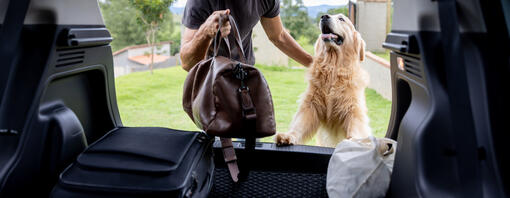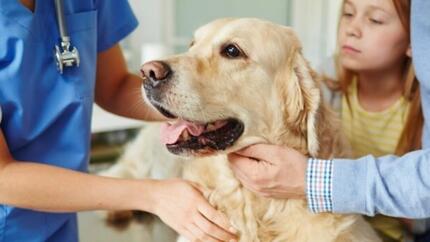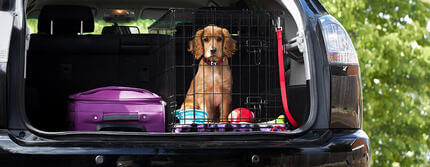
Does your dog experience car sickness? This can be a distressing condition for both you and your pet. By understanding the causes, symptoms, and treatment options for dog car sickness, you can help manage and alleviate your dog's car discomfort effectively.
While there is no universal solution for car sickness, taking steps to manage the symptoms can make car rides more comfortable for your dog. So let’s find out what causes it and how you can prevent and manage it..
What Causes Dog Car Sickness?
Dog car sickness can be an unsettling experience for both dogs and their owners. Recognising the causes of this condition can aid in taking the necessary steps to prevent or manage it. Here are some key factors contributing to your dog’s car sickness:
1. The Role of the Vestibular System: Dogs possess a complex balancing mechanism called the vestibular system, responsible for maintaining their equilibrium. The constant motion of a moving vehicle can disrupt the balance signals sent to the brain, leading to car sickness.
2. Differences Between Puppies and Adult Dogs: Puppies are more susceptible to car sickness compared to adult dogs owing to their underdeveloped vestibular systems. As puppies grow and their systems mature, their susceptibility to car sickness tends to decrease.
3. Common Triggers for Car Sickness: Various factors such as anxiety, stress, and unfamiliar surroundings can trigger car sickness in dogs. The motion of the car, particularly sudden turns or stops, can also contribute to this condition. Additionally, poor ventilation or strong odours within the vehicle can exacerbate symptoms.
Recognising Symptoms of Dog Car Sickness
When travelling with your furry friend, it's crucial to be aware of the signs of car sickness. Just like humans, dogs can experience discomfort and unease during car rides. Here are some of the signs:
- Excessive drooling
- Whining
- Vomiting
- Restlessness
- Anxiety
- Uneasiness
- Drooling
- Yawning
- Loss of appetite
- Decreased balance and coordination (especially in older dogs).
Preventive Measures for Dog Car Sickness
Preventing car sickness involves several measures to help your pet have a more enjoyable and comfortable journey. From training techniques to environmental adjustments and dietary considerations, here are some tips to alleviate car sickness in dogs:
- Familiarise your dog with the car by taking short drives around the neighbourhood before going on a longer journey.
- Use a suitable dog harness or carrier to secure your pet during the car ride.
- Keep the car well-ventilated by opening the windows slightly or using the air conditioning.
- Avoid feeding your dog a large meal before a car journey, as a full stomach can increase the chances of nausea and vomiting. Instead, offer a light meal or small snack a few hours before the trip.
- Plan regular breaks during long car journeys to allow your dog to stretch their legs and relieve themselves.
- Prioritise exercise before the car journey to help tire out your dog.
By implementing these preventive measures, you can help reduce the occurrence of car sickness and make travel more enjoyable for both you and your four-legged companion. Remember, every dog is unique, so consult with your veterinarian for personalised advice and recommendations.
Treatment Options for Dog Car Sickness
Dog car sickness can be a distressing condition for both pets and their owners. Fortunately, several treatment options can help alleviate your dog's discomfort during car journeys. Here are some strategies to try:
Natural Remedies and Behavioural Strategies:
- Steadily introduce your dog to car travel by taking short trips and gradually increasing the duration. This can help desensitise your dog to the motion and reduce car sickness.
- Ginger is known for its anti-emetic properties. You can try giving your dog a small amount of ginger as a dog car sickness natural remedy, either in the form of ginger biscuits or by adding powdered ginger to their food.
- Natural calming aids such as lavender or chamomile, can help relax your dog during car rides.
In general, natural remedies are much less effective compared to medications. Therefore, if your dog really struggles during car journeys, it is much better to speak with your vet to determine the best possible combination of drugs.
Over-the-Counter and Prescription Medicines:
- Anti-nausea medicines: Your veterinarian may prescribe dog car sickness tablets to help alleviate your dog's car sickness. This medication can reduce nausea and vomiting.
- Motion sickness medication: Over-the-counter medicines specifically designed to alleviate motion sickness in dogs can help prevent – or reduce – the symptoms of car sickness.
When to Consult a Veterinarian:
If your dog's car sickness persists or worsens despite trying natural remedies and over-the-counter medicines, it is important to consult a veterinarian. They can assess your dog's specific condition and recommend appropriate treatment options or further investigations.
It's important to consult with your veterinarian if your dog experiences severe car sickness or if you have any concerns. They can provide tailored advice and recommend suitable products to help make car journeys more comfortable.
Now that you know how to stop dog car sickness, learn more about nausea in dogs by reading this article on Dog Vomiting.




